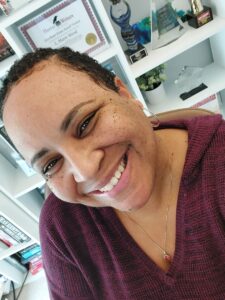Black Heritage in Horror Month 2024: An Introduction by Dr. Lisa Wood

by Dr. Lisa Wood
I’m often asked about being an African American writer in the horror genre. The question is fair; I am an African American writer who has been a psychological horror author for a long time, so it would follow that I have witnessed trends and patterns over the years and might have a comment toward it. But the question, in and of itself, is one that I wish never had to be asked again. It implies that there is a difference between African American people versus other racial groups in the genre. It implies that today a difference still exists, as much as it did in the early 2000s when I, a newly published, fresh-faced author, was asked the question for the first time. It is a struggle we are making headway on, but one that we still must overcome. That means different things for different people.
The African American horror community is as diverse as our genre’s many subgenres; one can find writers from all walks of life writing any manner of horror, from visceral to quiet, and doing so from their unique perspectives. Because, you see, this is what makes African American fiction our own. The creativity we bring to our stories, the settings and traditions that make up our characters, the idiosyncrasies and proclivities, euphemisms and eccentricities… the way we choose to write and what we choose to write about makes it ours. Because I am African American, my writing – all of it – is inherently African American. The boxes that our writings are often relegated to, whether you think of the race narratives that were considered the only publishable work by authors of color in our early publishing history or the lumping of all African American work into one race-based section regardless of genre type or scope that exists today in the few big-box brick and mortar bookstores that still exist, are not only limiting, but they are also false. African Americans are as diverse as everyone else. We should not have to write our stories in a way that makes them palatable to others, nor should we have to live up to anyone’s expectations of how race and gender are expressed. We, as African American authors – African American creators – should be able to tell the story we want to tell the way it comes to us, using whatever characters we see fit and not ones designed to satisfy other people’s stereotypical expectations. We should write characters who reflect real personality traits and make logical decisions, or we should make it all up as we create worlds and subsystems that operate differently than humankind… just like everyone else does. Others don’t have to work within those constructs, as history has shown. Neither should we. African Americans have stories to tell, just as everyone else does, and we should be able to tell them the way we want to. And those stories – that diversity – should not be seen as “different” at all. They should be seen as good writing, another option for a reader to enjoy. But unfortunately, we are not there yet.
As we work to foster this change, we have to consider what is needed to bring it about. We need more African American creators – more novelists, editors, and publishers. We need more work out in the world, reaching corners we have not previously to introduce readers to our work. We need a shift in mindset, an adoption of the notion that African American people can and do write more than social commentary-laced work, that we produce genre fiction that would be of interest to all (whether realistic or fantastic), and that readers of all backgrounds need to expand their horizons, they need to consume stories written by African American creators without the race of the protagonist/antagonist being a factor because being inclusive can only serve to better everyone. Progress is being made, but there is more work to be done and we stand at the forefront of that movement, leading the charge.
So, what can we do?
Several things:
- Learn as much as you can from as varied a group as possible.
- Read broadly – you can’t create something new until you know what has already been done.
- Read deeply – find favorites and speak about them, understand the nuance of the work you like and why… thinking critically this way will not only provide a different perspective of a story you love, but it will enhance your own work as well.
- Get involved. Organize and socialize, attend events, and meet people. Join writing groups; facilitate discussion. Doing something will not only get your hands dirty, but it will enrich your experience as a member of the writing community at large.
- Advocate for yourselves and for each other. Celebrate your wins as well as other people’s. Welcome new writers and encourage someone who is struggling. We are all in this together.
- Hone your skills. Without this, the rest is unimportant.
- And finally, keep writing.
Dr. Lisa Wood, MFA
President, Speculative Fiction Academy
Vice President, Horror Writers Association
Author (as L. Marie Wood), The Realm Trilogy

Lisa Marie Wood is a psychological horror author, recipient of the Golden Stake Award, a MICO Award-winning screenwriter, a two-time Bram Stoker Award® Finalist, a Rhysling nominated poet, and accomplished essayist. Wood is the Vice President of the Horror Writers Association, founder of the Speculative Fiction Academy, an English/Creative Writing professor, and a horror scholar.



